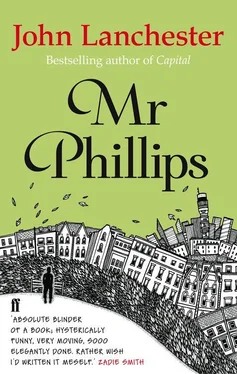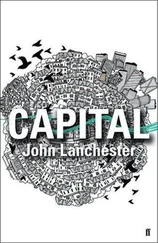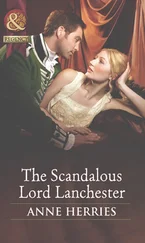‘Right, last one. Fifteen seconds,’ shouts one of the men on the other side of the bank counter. Mr Phillips, if forced to guess, would say that the man is a Scouser. If the robber crosses into the bank lobby with whatever he is using to carry the money slung over his shoulder — Mr Phillips can’t see, but the men are clearly jamming bank notes into some kind of bags or haversacks that they’ve brought with them — another item that should perhaps be banned from banks, along with crash helmets — if he comes out, points his sawn-off at Mr Phillips and blows his head off, for any reason or no reason, today, 31 July, will be the day that was lying there in wait for him all his life, hiding in the calendar, in secret parallel to 9 December, his birthday. Everybody has this day, hiding in plain sight, the one day out of the 365 which has a significance for us that we aren’t here to know about. His deathday will be the day on which Mrs Phillips and the boys remember him, or remember him with particular vividness, Mrs Phillips especially. For her 31 July would be like a returning ache, every year. The boys would make a big effort to be with her, at least for the first few years, but then the practice would be less strict, it would gradually die out like a national custom that people were gradually forgetting. Only for Mrs Phillips would the day continue to have its special weight in the calendar, a day she would always dread, when she wouldn’t be able to bear the sound of certain pieces of music.
Today could be the day … any day could be the day, of course, that is the whole point, but today especially. Mr Phillips puts his hands under his shoulders and pushes himself up. Then he gets to his feet. As he does so he realizes he is holding his hands above his shoulders, and that this gesture doesn’t really make sense any more, so he lowers them. His view of what is going on in the bank is very much better from up here. In fact there’s no comparison. Mr Phillips can see the way people are lying scattered in the face-down position, not radiating out from a single point but higgledy-piggledy, pointing in all directions. Clarissa Colingford, who is lying with her face turned to the right away from him, has her trousers stretched over her buttocks, not quite so stretched that the material is shiny, but nearly. It is quite a sight. He can also see the two bank robbers in the front part of the bank. Both of them are looking at him with as much of a surprised expression as it’s possible to have inside a motorcycle helmet. The two men are thin and wiry. Mr Phillips probably weighs as much as one and a third of them. He says:
‘I’m not doing that any more.’
‘You fucking —’ says one of the men, advancing towards Mr Phillips, not pointing the gun directly at him but pointing it past his side. He forgot to shout, and his accent is definitely Liverpudlian.
‘Get the cunt down!’ shouts the robber behind the counter who seems to be in charge. It has been at least two minutes since he shouted about its being fifteen seconds until they would finish, so perhaps something is going wrong. He does not look at Mr Phillips as he shouts but down at the counter, below which his colleague is doing something out of sight.
‘I’m not going to get down,’ says Mr Phillips. ‘I think everyone should feel free to stand up.’
The other people in the bank are by now all looking at him, their necks doing all sorts of kinks and cricks in order to do so. People’s faces are extraordinarily blank. Between them they can’t notch up so much as a single expression. There is no way to tell what they are thinking. Even Clarissa Colingford, who has turned her head around and is now lying with her right cheek on the floor — she has turned around in order to get a better view of Mr Phillips! — you can see the red imprint of the carpet on her face — even Clarissa Colingford looks as she might look in a camera that was turned on her while the main camera, the one that was broadcasting live, was following someone else. Her face is off duty.
‘If you don’t lie down on the fucking floor you’re going to get your fucking head blown off,’ the nearest robber shouts — he remembers this time. His shotgun is pointed at Mr Phillips’s stomach. Mr Phillips does not move.
‘I think you should all get up too,’ he says to the other people in the bank. ‘What’s the worst that can happen?’
They all stay where they are. It is what Mr Phillips would have done in their shoes. A little old lady writhes around on the floor and Mr Phillips for a moment thinks she is about to get up, but it turns out she is only manoeuvring to be more comfortable and to get a better view. The others do not make eye contact with Mr Phillips — it is psychologically and physically difficult to make eye contact with a standing man when you are lying face down on the floor — and are looking in his general direction rather than looking at him.
Mr Phillips feels a great sensation of lightness. It is as if his life is a crushing weight, a rucksack filled with bricks that he gradually got so used to he forgot it was there, and he has now managed to shift the burden so that the sense of ease, of release, is exhilarating. He feels that he could hop ten feet straight into the air. Or, more gently, just decide to float upwards, so that his perspective down on the floor-people would become steeper, and the bank robbers would crane their necks up at him in amazement, and then he would be up through the roof, looking down at the building and out across Knightsbridge, the traffic, Harrods already visible, and then further up, able to see the Victoria and Albert Museum, the way you can fly in a dream (though even in a dream you always know you’re going to fall back down, and Mr Phillips has no such feeling) and then further and further up, the Thames snaking away behind and London turning into an aerial photograph and then into a map of itself, the horizon stretching further and further away, startled birds and pigeons swerving to avoid him, up through the first thin layer of wispy cloud and then further up into the clean blue, the haze of pollution and fug over the city becoming visible as it is left behind, the countryside spreading out and expanding as London shrinks, and then England shrinks, turns into an island as he gets higher and higher up, so that he can see the Channel, the crinkly coasts of Ireland and France, then the blob of Paris, so small from up here, and the Low Countries, and then Europe shrinks, and he can see out over the Atlantic, into Russia, and then the edges of the Earth itself would come into view, and Mr Phillips would float free of the planet, out into the clean nothingness of space, and suddenly the Earth would seem tiny and fragile and blue and green, shrinking fast, and most of the universe would be darkness in which the stars and planets would seem tiny, decorative, hardly disturbing the beauty and calm of the blank, lifeless void.
The bank robber nearest to Mr Phillips is looking at him steadily and seems to be working out what to do. He half-turns to look at the other robbers and then he begins to move his shotgun upwards in the direction of Mr Phillips’s head. As he does so a loud and distorted voice, coming through a megaphone, says:
‘Armed police. Throw down your weapons.’
According to the very nice Detective Sergeant who took Mr Phillips’s statement, the police had been acting on a tip-off. They had been following the gang for some time before the robbery and were only been waiting for them to begin the actual robbery before moving in and arresting them.
‘Trouble is we were expecting three of them and a driver. When it turned out there were four of them and a driver it made things more tricky. So we decided to get them as they came out of the bank. Then you had your bright idea, sir, if you don’t mind my putting it like that, and we had to come in then and there. You gave us a bit of a fright, sir.’
Читать дальше




![Unknown - [Carly Phillips] The Bachelor (The Chandler Brothe(Bookos.org) (1)](/books/174132/unknown-carly-phillips-the-bachelor-the-chandle-thumb.webp)







